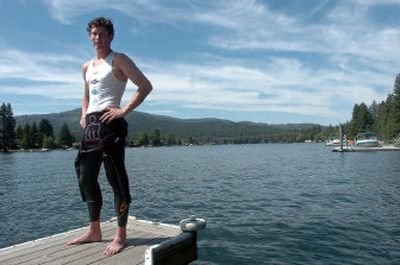Ironman good fit for him

AT A TIME when Cameron Chesnut was training for triathlons and preparing to enter medical school, he hadn’t scheduled in bad luck. His bad luck came in the form of a car failing to yield while riding his bike and hitting him head-on and a slick Australian trail which took away his footing and left him with a deep, infected cut on his shin.
After all that, Chesnut is nearly 100 percent and training for Ironman triathlons as he begins medical school in Moscow this fall.
All of this started with the 2000 graduate of Post Falls High School’s decision to quit the golf team at Washington State halfway through the 2002-03 season in order to devote himself full time to training for, at the time, Olympic-length triathlons.
He had just begun attempting triathlons in the summer of 2002, and about six months later, the flirtation became infatuation.
“I just kind of did it at first for fitness and fun,” Chesnut said. “It passed golf, and I had to pick one or the other and I chose this, which I’m very happy about right now. It was a tough decision.”
Chesnut graduated from WSU in 2004, and, at the urging of his mother, took a year off from school and headed to Newport Beach, Calif., planning to work out from September-March, then move to Australia to continue training at the Australian Olympic training center.
That plan got as far as January, when Chesnut, while riding his bike on the Pacific Coast Highway, was hit by a car.
“I lost four front teeth, busted up my face pretty bad and my hip and shoulder,” Chesnut said. “I’ve had four plastic surgeries, and we’re still in the process of fixing my teeth.”
It took Chesnut about three months even to walk again, and then, while in Melbourne running, he slipped on a wet trail, hit a rock and cut his shin to the bone. That cut became infected and turned into another surgery.
So, in the span of about four months, Chesnut lost a lot of training time, which, coupled with the idleness, sapped him of much of his physical fitness. His determination, though, was still there.
“I don’t know if I’m even back to where I was before (all the injuries),” Chesnut said. “You get worse for four months, so it takes about eight to get back to where you’ve been.”
He’ll have to get back to where he was plus some, as he made the recent decision to forgo Olympic-style triathlons (.93-mile swim, 24.8-mile bike, 6.2-mile run) for the Ironman format (2.4, 112, 26).
A combination of the time commitments medical school demands as well as the bureaucracy and constraints involved in qualifying for an Olympic team led him to the decision.
“It’s very political with the selection and it’s a bureaucratic nightmare,” Chesnut said. “With the step up to Ironman, you don’t have to worry about any of that. There’s no team to worry about, and it also plays into my strength a lot more.”
His strength, Chesnut explained, is biking and running, which make up such a large part of the Ironman triathlon.
Medical school may also cause some problems for Chesnut, who would like to become an orthopedic or cardiovascular surgeon, but he thinks attending school while training won’t cause too much of a problem.
“There are people who study all the time and barely sleep, and there are others who do it and play intramural sports and go out with their friends,” Chesnut said. “I developed some good study habits, kept my grades and still had time to train.”
Chesnut is enrolled in the University of Washington medical school (which allows students to take their first year in a smaller setting, such as Moscow, because UW is the only area med school), and the school has assured him he could occasionally miss a week of school if he absolutely had to.
He should know if he can balance the two at midterms, when he has his final race of the year during the middle of testing.
By then, he also hopes to know whether or not his decision to switch to Ironmans was a good one, as he does his first half-Ironman in September in Grand Coulee, Wash.
“It’s a long-term type of event,” Chesnut said. “You can’t zone out. That’s definitely one of my strengths in regular racing.
“We’ll find out whether I’m right or wrong.”